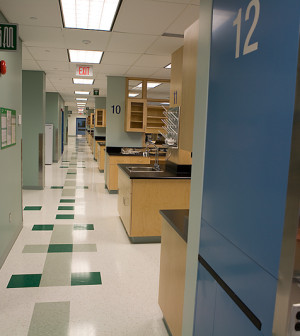- Could Your Grocery Store Meat Be Causing Recurring UTIs?
- Are You Making This Expensive Thermostat Error This Winter?
- Recognizing the Signs of Hypothyroidism
- 10 Strategies to Overcome Insomnia
- Could Artificial Sweeteners Be Aging the Brain Faster?
- Techniques for Soothing Your Nervous System
- Does the Water in Your House Smell Funny? Here’s Why
- Can a Daily Dose of Apple Cider Vinegar Actually Aid Weight Loss?
- 6 Health Beverages That Can Actually Spike Your Blood Sugar
- Treatment Options for Social Anxiety Disorder
DNA May Affect What Bugs Reside in Your Gut

At least some of the microbes that live in your gut may be influenced by your genes, a new study finds.
“We set out to find out about human genes that are implicated in the regulation of the gut microbiome, and we found some that are,” said senior study author Ruth Ley, an associate professor in the department of microbiology at Cornell University, in Ithaca, N.Y.
For example, the researchers found a link between the LCT gene — involved in making the enzyme that helps the body digest dairy products — and a type of microorganism called Bifidobacterium, which is commonly used in probiotics.
“Based on our research, we identified more than a dozen microbes with known links to health that are heritable,” Ley said. “These microorganisms are environmentally acquired, but the genome also plays a part — by determining which microorganisms are more dominant than others.”
Some of the other genes involved were related to diet preference, metabolism and immune defense, the researchers said.
The findings were published May 11 in the journal Cell Host & Microbe.
“The overall numbers in this study were still small for genome-wide association analysis, but they help validate some of the findings we’ve seen in smaller studies,” Ley said in a journal news release.
“This type of study opens up many questions, but doesn’t give us a lot of answers yet. It gives us lots of ideas to study,” she added.
More information
The American Society for Microbiology has an overview of the human microbiome.
Source: HealthDay
Copyright © 2026 HealthDay. All rights reserved.










